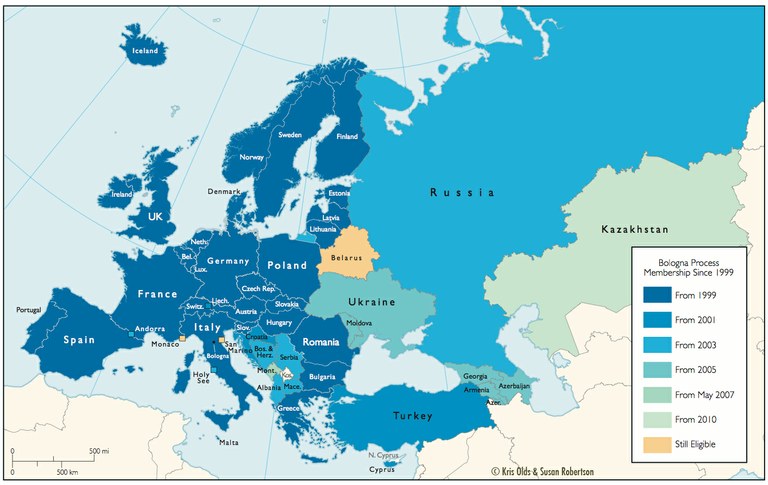Denmark assumes Chairmanship of the Bologna Process
On 1 January 2012 Denmark assumed the chairmanship of the Bologna Process together with Azerbaijan. Launched in 1999, the Bologna Process today counts 47 countries in and around Europe that work together on creating a joint European Higher Education Area (EHEA).
Making study destinations in Europe more attractive
The main goals of the EHEA are the free movement of students and scholars and the development of common standards to ensure that higher education in Europe is comparable and attractive to students not only from European countries but also from other continents. Thus, by participating in the Bologna Process, Denmark has become a more transparent and attractive study destination.
One of the major objectives during the Danish Presidency is to further develop and consolidate European co-operation to promote student mobility, quality assurance, recognition of qualifications, employability, student-centred learning and other non-binding policies among the participating EHEA countries.
Denmark to drive process forward
The Danish Presidency in 2012 will be marked by the EHEA Ministerial Conference on 26-27 April 2012 in Bucharest. The conference is held every two to three years and brings together the ministers of higher education from the 47 participating countries who will present their political priorities for the next period until 2015.
About 500 participants are expected in Bucharest, including 40 delegations from Asia, Africa, the Middle East and South America. They will gather at the Bologna Policy Forum to share experiences and intensify policy dialogue on cooperation and challenges in higher education.
Preparation of ministerial communiqué
In addition to the Ministerial Conference, the so-called Bologna Follow-Up Group will meet at the University of Copenhagen on 19-20 March 2012. The group consists of approx. 90 senior officials from the participating countries and organisations and works to drive the process forward between the ministerial conferences.
When the follow-up group meets in Copenhagen the focus will be on the preparation of a ministerial communiqué to be signed by the ministers at the Ministerial Conference. The communiqué will outline the future priorities of the European Higher Education Area – an important policy document.
Another focal point will be a report that looks at how the 47 EHEA countries are performing in facilitating student mobility, quality assurance, recognition, learning outcomes and transparency in their higher education systems.
Denmark excels in the Bologna Process
Denmark has since the outset of the Bologna Process been among the countries most advanced in implementing the Bologna Process objectives.
The Danish higher education system has become more transparent with the introduction of a degree structure with three levels: undergraduate, graduate and doctoral degrees. Furthermore, Denmark has implemented the ECTS system and established an international grading scale for its higher education.
In April 2009, Denmark ranked second in the annual "Bologna Scorecard" taking stock of the Bologna Process in the participating countries. We await the 2012 implementation report to see how Denmark fares this time.

Visit the official website of the European Higher Education Area
About the Bologna Process
The aim of the Bologna process is to create a joint higher education area by establishing common standards for academic degrees and quality assurance, thus making higher education systems more comparable and compatible throughout Europe.
The Bologna Process currently has 47 participating countries of which 27 are EU Member States. The European Commission participates as a full member, and a range of organisations such as the Council of Europe, the European Students’ Union, the European University Association and UNESCO participate as consultative members.
- News
- New study residence scheme for foreign nationals who want to combine career and a master’s degree Jul 04, 2025
- Survival guide for international students Mar 25, 2025
- Almost 8,000 international applicants Mar 20, 2025
- The application deadline for 2025 is just around the corner Mar 06, 2025
- Live chat on applying for a higher education study programme in Denmark Jan 22, 2025
- Useful websites when preparing to study in Denmark Jun 13, 2024
- Application deadline for 2024 is approaching Feb 26, 2024
- Time to Mind Feb 06, 2024
- Do you have questions about applying for a study programme in Denmark? Jan 04, 2024
- Are you going to apply for an education in Denmark? Feb 02, 2023
- The 2022 edition of International students' survival guide Sep 23, 2022
- Introduction to the Danish education system – from primary school to higher education Mar 21, 2022
- Copenhagen ranks highest in the Safe Cities Index 2021 Aug 31, 2021
- Two Danish universities among world's 100 best Jun 10, 2021
- Nordic countries top 2021 World Press Freedom Index Apr 21, 2021
- Denmark ranks among the world's most peaceful countries Jun 30, 2020
- Denmark is the world's most prosperous country Jun 15, 2020
- Coronavirus/COVID-19 in Denmark Mar 12, 2020
- Danish Government Scholarships for exchanges in Denmark in 2020/2021 has opened Jan 24, 2020
- Denmark is the world’s best country in two areas Jan 23, 2020
- Denmark is, still, one of the safest countries in the world Jul 19, 2019
- Denmark has the fifth best higher education system in the world Jul 17, 2019
- Danish Government Scholarships for 2019/2020 has opened Feb 12, 2019
- Copenhagen is named top city to visit in 2019 Feb 12, 2019
- Denmark has the best work-life balance in Europe Feb 26, 2018
